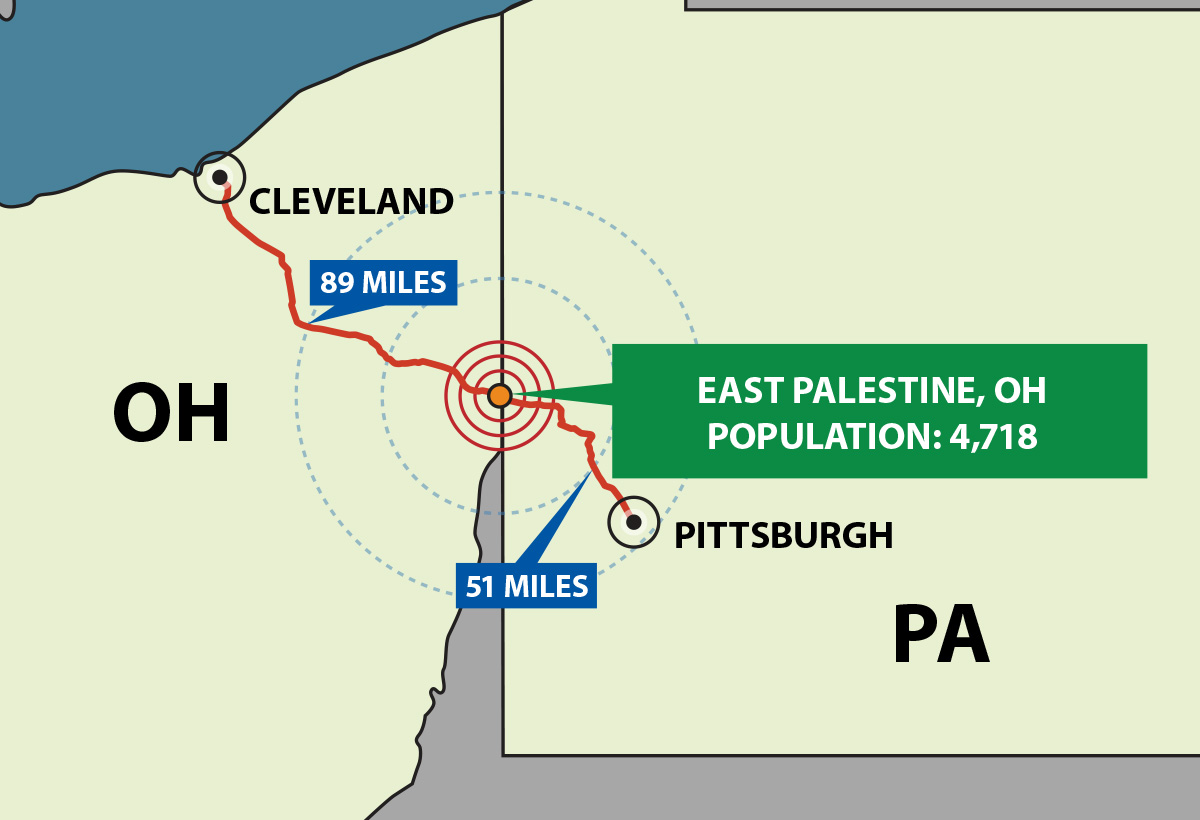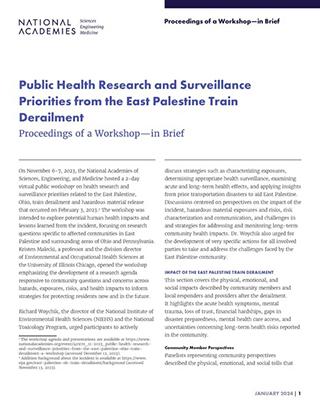Background

It was the evening of Feb. 3, 2023, when a Norfolk Southern Railway Company train carrying hazardous materials derailed in the village of East Palestine, Ohio. Some of the train cars caught fire and some spilled their loads onto the ground. These substances traveled into local waterways and flowed miles downstream.
What Is NIEHS Doing
Since the incident occurred in 2023, many local, state, and federal agencies, including NIEHS, have been part of a coordinated response to support the communities affected by the derailment in East Palestine and surrounding areas of Ohio and Pennsylvania.
From the early days of the disaster, NIEHS has been actively engaged to understand the community concerns about potential health impacts, and to identify opportunities for needed research. Much of this was done through the National Institutes of Health (NIH) Disaster Research Response (DR2) Program.
Determining Research Priorities - Virtual Workshop

Public Health Research and Surveillance Priorities from the East Palestine Train Derailment
In November, 2023, NIEHS and its partnering NIH institutes (Eunice Kennedy Shriver National Institute of Child Health and Human Development, the National Cancer Institute, the National Institute of Neurological Disorders and Stroke, the National Institute on Aging, the National Institute of Mental Health) joined with the Centers for Disease Control and Prevention/Agency for Toxic Substances and Disease Registry, to support a workshop that brought together community members and health and research experts to better understand the health impact of the rail disaster.
The virtual workshop, “Public Health Research and Surveillance Priorities from the East Palestine Train Derailment,” was convened Nov. 6-7, 2023, by the National Academies of Sciences, Engineering, and Medicine (NASEM).
The Proceedings of a Workshop-in Brief report, was released in early January, 2024.
Awarding of Six New Research Grants
In February 2024, NIEHS funded six new grants to conduct research and community engagement activities in East Palestine. Many of the grantees have already been working in the area and have established good working relationships with the community.
These awards were made through the NIEHS Time-Sensitive Research Program focused on environmental health sciences. To apply, visit NIH Grants & Funding.
Meet the researchers who are leading these new grants
Case Western Reserve University

Principal Investigator: Frederick Ray Schumacher, Ph.D.
This research team will engage community partners and talk with East Palestine residents to better understand their experiences and concerns during and after the disaster. The team will initiate a long-term follow-up study to better understand the impact of chemical exposures on health through DNA damage.
Texas A&M University

Principal Investigator: Natalie Johnson, Ph.D.
The team will apply a mobile air sampling strategy to rapidly characterize potential health risks from hazardous volatile organic compound (VOC) exposure in the aftermath and recovery phases of the East Palestine environmental disaster.
University of California, San Diego

Principal Investigator: Beatrice Golomb, M.D., Ph.D.
The researchers already have a community partnership in East Palestine, Ohio, and have conducted interviews with affected residents. They will begin recruiting a cohort of residents to assess the short-term (approximately two to three years) health impact of being exposed to a mixture of toxins.
University of Kentucky

East Palestine Train Derailment Health Tracking Study
Principal Investigator: Erin Haynes, Dr.P.H.
This research project will include a health tracking study (via an online survey) to collect longitudinal measures of health symptoms, stress, and well-being of East Palestine residents. A researcher network will also be established to help successfully report back and disseminate research findings to the community.
- East Palestine Train Derailment Health Tracking Study. Everyone 18 years and older in the community, even those who are not experiencing symptoms, can participate.
University of Pittsburgh

Profiling the Post-Accident Exposome in East Palestine
Principal Investigator: Peng Gao, Ph.D.
This research project will collect soil, water, and sediment samples to assess the extent of chemical contamination. The research team will also document the ongoing impact on the region’s local environment and highly connected waterways.
University of Pittsburgh

East Palestine Community-Engaged Environmental Exposure, Health Data, and Biospecimen Bank
Principal Co-Investigator: Juliane Beier, Ph.D.
Principal Co-Investigator: Maureen Lichtveld, M.D., M.P.H.

This project will actively engage community members in research to collect water and air samples in their homes. The project team will also collect blood samples and other health data to assess and reduce the immediate and long-term impacts of exposure to vinyl chloride and other chemicals on the liver.
- East Palestine Train Derailment Health Studies at the University of Pittsburgh. If interested in participating in this study, please register online.
The East Palestine, Ohio Train Derailment Study
NIH has responded to the ongoing concerns of the community of East Palestine, OH by developing a research opportunity announcement (ROA) entitled The East Palestine, Ohio Train Derailment Study (OTA-25-007). This ROA coincides with the conclusion of our time-sensitive R21 studies in support of East Palestine, OH. The primary objectives of the ROA include administering a community health needs assessment, developing a longitudinal study to assess health outcomes and risks, training and education for the community and local clinicians, and a health tracking system to identify health conditions associated with the derailment.
NIEHS has committed $10 million over the next 5 years to pursuing answers for this impacted community. This group research effort, known as the East Palestine Investigation Consortium (EPIC), will be driven by the community and supported by a consortium of researchers across multiple disciplines. Community partners will have a major role in shaping the research priorities and ensuring that the interests of the community are addressed at every step. The consortium will be compromised of researchers from the University of Kentucky (program lead), the University of Pittsburgh, Yale University and the Ohio State University. The program is administered by NIEHS and the National Center for Advancing Translational Sciences (NCATS). NIH will play a very hands-on role within EPIC by providing support, resources, and guidance as activities ramp up for the effort.
University of Kentucky

Principal Investigator and Program Lead: Erin Haynes, Dr.P.H.
The University of Kentucky will receive $1.8 million for the first year of the study to coordinate and execute the primary objectives outlined by commuity feedback.
University of Pittsburgh

Principal Investigator: Juliane Beier, Ph.D.
The University of Pittsburgh will study liver and thyroid function as part of the research team.
Yale University

Principal Investigators: Nicole Deziel, Ph.D. and Michelle Bell, Ph.D.
Yale University will evaluate water quality through state-of-the-science hydrological modeling.
The Ohio State University

Special Consultant: Darryl Hood, Ph.D.
Dr. Hood will lend his 20+ years of expertise in neurotoxicology and community-based research experience to the success of EPIC and the East Palestine, Ohio Train Derailment Study.
More information on study participation and community meetings will be shared on this webpage in the future.
Coordinating Research Activities by Working with East Palestine Healthcare Task Force
In April, 2024, NIEHS shared information about the new research grants to the members newly formed East Palestine Healthcare Task Force. The Task Force is led by East Palestine officials.
NIEHS will continue to support and coordinate its grantees as they work with the communities to conduct research that will help inform longer- term studies.
Upcoming Events
Nothing currently planned.
Resources
- Disaster Research Response (DR2) Program
- Grantees Working on East Palestine Research Response
- NASEM virtual Workshop – November 6-7, 2024 Public Health Research and Surveillance Priorities from the East Palestine, Ohio Train Derailment: A Workshop
- Responding to the East Palestine, Ohio, Train Derailment - Environmental Factor, March 2024
- Time-Sensitive Research Opportunities in Environmental Health
Other U.S. Government Efforts
- Agency for Toxic Substances and Disease Registry East Palestine Train Derailment
- The White House Fact sheet, One year after the train derailment
- U.S. Environmental Protection Agency Response
NIEHS Points of Contact

Claudia L. Thompson, Ph.D.






